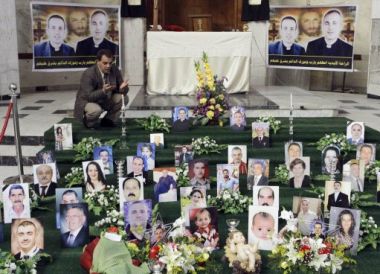We must not 'resign ourselves' to extinction of Christians in Middle East - Pope

Christians are suffering in the Middle East but there is still hope for their future in the region, the Pope has suggested.
Pope Francis was meeting with Major Archbishops and the Patriarchs of the Oriental Catholic Churches in the Vatican City this week to discuss the plight of Christians in the Middle East.
"Guidelines will emerge intended to support the mission entrusted by the Council to our brothers and sisters in the East: that of 'promoting the unity of all Christians, especially Eastern Christians," Pope Francis assured.
He spoke of how "grateful" the Church was for the "great cost" many Christians in the Middle East have endured in order to share the Gospel and live Christ-like lives amidst the threat of violence and even death.
Last week, Minister for Faith and Communities Baroness Warsi warned in her speech at Georgetown University in Washington that Christians and other religious minorities are experiencing a "global crisis" amid a rise in attacks against them.
"A mass exodus is taking place, on a Biblical scale," she said. "In some places, there is a real danger that Christianity will become extinct."
Ahead of the speech, Ms Warsi wrote in The Telegraph: "There are parts of the world today where to be a Christian is to put your life in danger.
"From continent to continent, Christians are facing discrimination, ostracism, torture, even murder, simply for the faith they follow. Perpetrators range from states to terrorists to people's neighbour."
Catholic charity Aid to the Church in Need spoke positively of Warsi's comments. National Director Neville Kyrke-Smith said: "All faith communities have suffered, but Christian groups have proved more vulnerable than most and have been disproportionately affected by violence and turmoil.
"Already decimated in Iraq, the Christian presence in Egypt and Syria is now in peril, representing an assault on some of the last remaining influential Church communities in the region."
Pope Francis acknowledged such concerns in his meeting with the Archbishops, saying: "Considerable worry is caused by the conditions of life faced by Christians who in many parts of the Middle East suffer gravely as a consequence of current tensions and conflicts.
"Tears often still flow in Syria, Iraq, Egypt and other areas in the Holy Land."
He said he would not rest while there remained those of any faith whose "dignity is undermined, who are deprived of the basic requirements for survival, robbed of their future, or forced to live as fugitives or refugees".
However, he expressed his conviction that the extinction of Christians was not a foregone conclusion.
"We must not resign ourselves to thinking of a Middle East without Christians, who for two thousand years have proclaimed Christ's name, integrated as citizens to all effects in the social, cultural and religious life of the nations to which they belong."
He instead made an appeal for religious freedom, and called for prayers for those suffering as a result of their faith.
"Prayer disarms ignorance and generates dialogue where there is open conflict. If it is sincere and persistent, it will make our voice humble and firm, capable of being heard by the leaders of nations," he said.
Pope Francis concluded his speech by speaking about Jerusalem as the "Spiritual birthplace" of the Church.
"I hope for every consolation, so that it may truly be a prophesy of that definitive convocation, from east to west, promised by God," he said.











